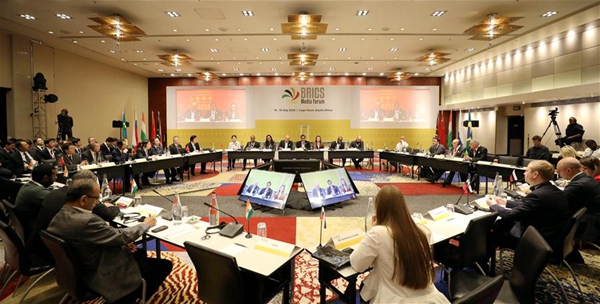BRICS cooperation: from Xiamen to Johannesburg
- By Rabi Sankar Bosu
 0 Comment(s)
0 Comment(s) Print
Print E-mail China.org.cn, July 24, 2018
E-mail China.org.cn, July 24, 2018

The leaders of the five BRICS countries will gather for their 10th summit, titled, "BRICS in Africa: Collaboration for Inclusive Growth and Shared Prosperity in the 4th Industrial Revolution" in Johannesburg, South Africa between July 25 and July 27. Chinese President Xi Jinping, Indian Prime Minister Narendra Modi, Russia's President Vladimir Putin and Brazil's President Michel Temer will attend the three-day event at the invitation of South African President Cyril Ramaphosa. It's expected that this year's Johannesburg summit will bring the five-member nations closer together to cooperate in order to play a more prominent role in global economic governance in the context of the current rising trends of protectionism, unilateralism, and anti-globalization.
Taking the title of the revolving BRICS presidency from China on January 1, 2018, this is the second time South Africa will host the summit of the emerging economic bloc since 2013. Last year in September, the BRICS summit was held in east China's coastal city of Xiamen, Fujian province. It is anticipated that the premier forum for international economic cooperation will be watched closely by the global public because, as President Xi Jinping noted, "The mechanism belongs not only to its members but also to the entire world." It should be noted that this will be Xi's first South Africa visit after he was re-elected president earlier this year. President Xi has always been optimistic about Africa's prospects, and he reiterated his desire for broader cooperation with the continent at the Xiamen summit.
BRICS is comprised of five emerging economies – Brazil, Russia, India, China and South Africa, who have come together with the aim of using their growing economic and political influence to challenge Western hegemony. Today, BRICS is regarded as a rising power of the global economy as it accounts for up to 23 percent of the world's GDP, and 43 percent of the world's population.
The 10th BRICS summit is taking place at a time when the world faces extraordinary political and economic challenges caused by U.S. President Donald Trump's protectionist policy and Britain's divorce from the European Union. In the light of trade hostilities introduced by the U.S., BRICS cooperation has become more important. Admittedly, the Johannesburg summit will provide the Heads of State to lead BRICS as a bulwark against protectionism.
This year's theme consists of three major global agendas: to ensure economic stability, to enhance sustainability to create a shared future, and to push for responsible development. These agenda items resonate well with last year's Xiamen summit which also emphasized the importance of a coordinated innovation drive in line with collaboration and inclusive growth in the fourth industrial revolution to address the prolonged sluggishness of the global economy.
As a staunch supporter of and participant in the BRICS mechanism, China sees BRICS cooperation as one of its diplomatic priorities. Cooperation among BRICS nations is an innovative practice that has surpassed the outdated mentality of political and military allies and built the partnership with mutual trust and benefits.
It is important to note that while the Western block has been painfully speculating that the BRICS luster is fading, the five BRICS members have worked together to solve neighborly quarrels and other important problems related to economic and trade cooperation through pragmatism and dialogue over the past ten years.
It is hoped that the Johannesburg summit will further demonstrate BRICS inclusiveness, confidence and openness as proposed in the BRICS Plus cooperation during the Xiamen summit.
Rabi Sankar Bosu, Secretary of New Horizon Radio Listeners' Club, West Bengal, India
Opinion articles reflect the views of their authors only, not necessarily those of China.org.cn.





